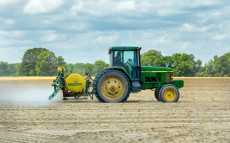- pathfindersAI
- Job Profile
Farm Equipment Mechanics and Service Technicians
Summary
Farm Equipment Mechanics and Service Technicians: A Career Overview
What They Do
Farm equipment mechanics and service technicians play a crucial role in maintaining the backbone of the agricultural industry. These skilled professionals are responsible for diagnosing, repairing, and maintaining a range of machinery and vehicles that are essential for farming operations. From tractors and harvesters to irrigation systems and tillers, their expertise ensures that farm equipment runs efficiently, minimizing downtime and maximizing productivity. Without their essential services, modern agriculture would struggle to meet the demands of feeding a growing population.
Job Responsibilities
The responsibilities of farm equipment mechanics and service technicians are multifaceted and extend well beyond basic repairs. They must conduct thorough inspections of equipment to identify issues, provide preventative maintenance to forestall potential problems, and troubleshoot complex mechanical, hydraulic, and electrical systems. Additionally, they often need to replace parts, calibrate machinery, and keep meticulous records of all work performed. Technicians may also be required to collaborate with farmers and other agricultural workers to offer advice on equipment use and best maintenance practices. This dynamic role often involves traveling to different farms and working in a variety of environments, from workshops to field settings.
Essential Skills
Success in this career demands a robust set of skills. Mechanical aptitude is essential, as technicians must understand and manipulate intricate machinery. Problem-solving abilities are equally critical, allowing technicians to diagnose and correct malfunctions efficiently. Given the technological advancements in modern farm equipment, proficiency in using diagnostic tools and software is becoming increasingly important. Additionally, strong communication skills are necessary for explaining complex issues to clients and providing clear instructions. Physical stamina and dexterity are also important, as the job often involves lifting heavy parts and performing repairs in less-than-ideal conditions.
Educational Pathways
To embark on a career as a farm equipment mechanic or service technician, aspirants typically need specialized education and training. Many begin their journey by earning a high school diploma or GED, followed by enrolling in a technical school or community college program that focuses on agricultural machinery, diesel technology, or a related field. These programs usually combine classroom instruction with hands-on training, covering topics such as engine repair, hydraulics, and electronics. In addition to formal education, many employers value practical experience, which can be gained through internships, apprenticeships, or entry-level positions. Obtaining industry-specific certifications, such as those offered by the Equipment & Engine Training Council (EETC), can further enhance a technician’s job prospects and credibility.
Career Prospects
The demand for farm equipment mechanics and service technicians remains robust, driven by the ongoing need for efficient agricultural operations. According to the U.S. Bureau of Labor Statistics, employment in this field is projected to grow steadily, offering numerous opportunities for those entering the workforce. Due to the specialized nature of the work, skilled technicians are often able to command competitive salaries and benefit from job stability. As technology continues to evolve, the role is also likely to need continuous upskilling, offering avenues for career advancement into supervisory or managerial positions, or even transitioning into other related fields such as agricultural engineering or equipment sales.
Conclusion
A career as a farm equipment mechanic or service technician is both challenging and rewarding, providing an essential service to the agricultural industry. With a blend of mechanical expertise, problem-solving skills, and specialized education, individuals in this field ensure that modern farming operations run smoothly and efficiently. For those passionate about machinery and interested in a hands-on career that supports a vital sector, becoming a farm equipment mechanic or service technician offers a promising and fulfilling professional pathway.
Video
Compensation
| State | Median Salary | Median Hourly | Positions |
|---|---|---|---|
| AL | 44,580 | 21.43 | 640 |
| AZ | 49,300 | 23.70 | 350 |
| AR | 45,460 | 21.86 | 780 |
| CA | 50,680 | 24.36 | 4,010 |
| CO | 61,190 | 29.42 | 150 |
| DE | 55,940 | 26.90 | 130 |
| FL | 44,620 | 21.45 | 820 |
| GA | 46,290 | 22.26 | 950 |
| ID | 48,300 | 23.22 | 800 |
| IL | 60,700 | 29.19 | 1,610 |
| IN | 49,540 | 23.82 | 1,620 |
| IA | 52,000 | 25.00 | 2,100 |
| KS | 49,990 | 24.03 | 1,700 |
| KY | 43,330 | 20.83 | 670 |
| LA | 51,840 | 24.92 | 120 |
| ME | 47,600 | 22.88 | 120 |
| MD | 46,120 | 22.17 | 300 |
| MA | 58,100 | 27.93 | 100 |
| MI | 48,220 | 23.19 | 1,090 |
| MN | 60,000 | 28.85 | 1,630 |
| MS | 45,540 | 21.89 | 610 |
| MO | 47,070 | 22.63 | 1,200 |
| MT | 52,900 | 25.43 | 420 |
| NE | 49,660 | 23.88 | 1,600 |
| NV | 63,530 | 30.55 | 90 |
| NH | 50,850 | 24.45 | 110 |
| NJ | 60,020 | 28.86 | 270 |
| NM | 38,920 | 18.71 | 140 |
| NY | 47,720 | 22.94 | 480 |
| NC | 48,900 | 23.51 | 490 |
| ND | 62,400 | 30.00 | 740 |
| OH | 48,270 | 23.21 | 1,330 |
| OK | 45,070 | 21.67 | 430 |
| OR | 58,630 | 28.19 | 650 |
| PA | 45,880 | 22.06 | 940 |
| SC | 46,660 | 22.44 | 390 |
| SD | 61,360 | 29.50 | 780 |
| TN | 49,810 | 23.95 | 710 |
| TX | 41,260 | 19.84 | 2,150 |
| UT | 51,640 | 24.83 | 170 |
| VT | 49,400 | 23.75 | 170 |
| VA | 48,660 | 23.40 | 550 |
| WA | 50,790 | 24.42 | 1,090 |
| WV | 39,670 | 19.07 | 40 |
| WI | 52,010 | 25.00 | 1,440 |
| WY | 56,160 | 27.00 | 70 |
Similar Occupations
In this area you will find other occupations that are close to the one you were viewing in tasks, knowledge and work environment. If the primary job profile you are viewing isn't quite to your liking, take a look around and see what else is available.
Basic and Premium Accounts have more alternative occupations available than the Free account.

Agricultural Equipment Operators - 45-2091.00
Agricultural Equipment Operators are responsible for driving and controlling farm equipment such as tractors, harvesters, and irrigation machines to plant, cultivate, and harvest crops. They perform routine maintenance on machinery, ensuring it functions efficiently to maximize farm productivity.
-
$39,690/yr
Median Pay -
28,910
Number of Jobs

Bus and Truck Mechanics and Diesel Engine Specialists - 49-3031.00
Bus and Truck Mechanics and Diesel Engine Specialists inspect, repair, and maintain the mechanical and electrical systems of buses and trucks, ensuring optimal performance and safety. They diagnose issues using diagnostic tools, replace faulty parts, and perform routine maintenance tasks to keep heavy vehicles running efficiently.
-
$58,970/yr
Median Pay -
285,030
Number of Jobs